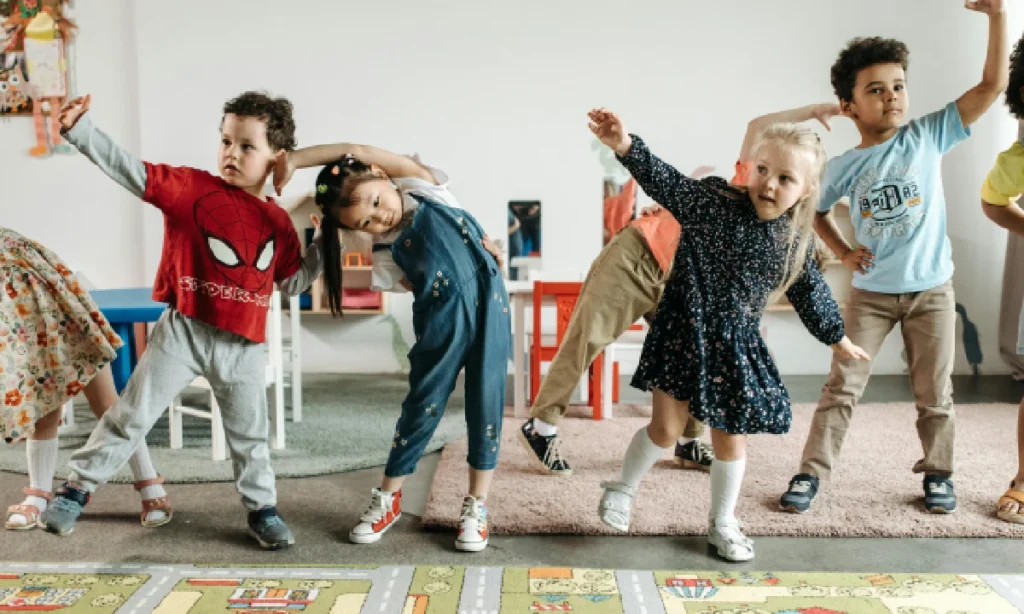![Murfreesboro Day School Redefines Early Childhood Education—Sparking Joy, Creativity, and Growth Through Purposeful Play. Introduction At Murfreesboro Day School, education is seen as a joyful journey rather than a rigid process. The school’s curriculum and daily routines are thoughtfully designed to ignite curiosity and […]](https://dayschools.org/murfreesboro/wp-content/uploads/sites/3/2024/09/New-Project-18.webp)
Table of Contents
Introduction
At Murfreesboro Day School, education is seen as a joyful journey rather than a rigid process. The school’s curriculum and daily routines are thoughtfully designed to ignite curiosity and foster discovery through playful, hands-on experiences. By engaging children in purposeful play, the school encourages them to explore their environment with enthusiasm and confidence. This approach ensures that learning happens naturally and organically, allowing each child to progress at their own pace while feeling supported and inspired.
Importantly, the school recognizes that early childhood is a critical period not only for cognitive development but also for building strong social and emotional foundations. Through a nurturing and stimulating environment, Murfreesboro Day School creates a space where children can flourish holistically. Their innovative practices emphasize that joyful learning and purposeful play are not just activities but essential elements that empower children to develop vital life skills, from problem-solving to collaboration, setting the stage for success in school and beyond.
The Philosophy Behind Murfreesboro Day School’s Approach
At the core of Murfreesboro Day School’s educational philosophy is a simple yet powerful belief: children learn best when they are happy, engaged, and free to explore their natural curiosities. Unlike traditional early education programs that often rely heavily on memorization and structured drills, this school champions a child-centered approach that prioritizes joyful discovery and meaningful interactions. Their philosophy is grounded in developmental research, which consistently shows that young learners thrive when learning is active, playful, and personalized.
Purposeful play serves as the essential bridge between curiosity and concrete knowledge in this model. It creates a dynamic space where children can experiment, ask questions, and make sense of the world around them. Every activity, whether it’s a creative art project or a math-based game, is thoughtfully designed to align with developmental milestones while also nurturing creativity and independent thinking. This ensures that foundational academic skills are built within a context that feels natural and enjoyable to the child, rather than forced or monotonous.
Furthermore, the school’s philosophy respects the individuality of each child, recognizing that learning is not a one-size-fits-all process. By honoring each child’s unique pace and style of exploration, Murfreesboro Day School fosters a supportive environment where children gain confidence in their abilities and develop a positive relationship with learning. Creativity is not merely encouraged but is considered a vital part of cognitive growth, helping children to develop flexible thinking, problem-solving skills, and the resilience needed to navigate future academic challenges.
What is Purposeful Play? Understanding Its Role in Learning
Purposeful play is a deliberate and meaningful form of play that seamlessly integrates learning objectives into enjoyable, child-led activities. Unlike unstructured free play, which is important for creativity but less focused on specific skills, purposeful play is intentionally designed to promote cognitive, social, and emotional development within a playful framework. At Murfreesboro Day School, this concept forms the foundation of their educational approach, making purposeful play a powerful tool to engage young learners in ways that feel natural and exciting.
Extensive research supports the idea that purposeful play positively impacts essential brain functions, including memory retention, attention span, and critical thinking. When children are encouraged to explore challenges through playful experimentation, they develop vital problem-solving skills and an ability to think creatively. Additionally, purposeful play nurtures emotional intelligence by providing safe opportunities for children to express feelings, negotiate roles, and collaborate with peers. This holistic development prepares children not only for academic success but also for healthy interpersonal relationships throughout life.
At Murfreesboro Day School, purposeful play is carefully crafted by educators who observe children’s interests and scaffold learning experiences accordingly. Whether it’s through imaginative role-play, hands-on science experiments, or cooperative games, each activity is designed to stimulate curiosity while reinforcing core developmental skills. This intentionality ensures that play is not just a break from learning, but a fundamental way in which children absorb information, build self-confidence, and develop a lifelong passion for discovery.

Curriculum Designed Around Playful Exploration
At Murfreesboro Day School, the curriculum is thoughtfully crafted to blend academic rigor with the natural joy of play, creating a seamless and engaging learning experience. The traditional boundaries between subjects like language arts, mathematics, science, and social studies dissolve within an environment that encourages hands-on exploration and inquiry-based learning. This approach transforms abstract concepts into tangible experiences, allowing children to grasp complex ideas through interaction and creativity rather than memorization. For example, storytelling becomes a gateway to vocabulary development, while math concepts emerge organically during building blocks or sorting games. This method fosters curiosity and empowers children to connect knowledge with their everyday experiences.
Teachers play a pivotal role in balancing structure with flexibility, carefully designing activities that guide children toward learning goals while respecting their individual interests and rhythms. This ensures that each lesson maintains a purposeful direction without stifling spontaneity or creativity. A science lesson on plant life exemplifies this balance: children might begin by walking through a sensory garden, feeling the textures of leaves and smelling fragrant flowers. This immersive exploration sparks questions and observations, which are then channeled into creative outlets such as drawing or crafting models of plants. Such multisensory experiences deepen understanding and invite children to engage both analytically and imaginatively.
Moreover, the curriculum encourages interdisciplinary connections, helping children see the world as an interconnected whole. Social studies topics, for example, may be explored through dramatic play where children role-play community helpers, or through collaborative projects that foster teamwork and cultural appreciation. This holistic design not only prepares children academically but also nurtures critical thinking, communication, and problem-solving skills. Through playful exploration, Murfreesboro Day School cultivates learners who are not only knowledgeable but also enthusiastic and confident in their ability to tackle new challenges.
Nurturing Creativity Through Arts and Imaginative Play
Creativity lies at the heart of the educational experience at Murfreesboro Day School, recognized not just as an artistic pursuit but as a critical cognitive and emotional skill. Daily integration of arts, music, and imaginative play provides children with rich opportunities to express themselves freely, fostering original thought and emotional depth. The school’s commitment to creativity encourages children to think beyond conventional boundaries, inspiring innovative problem-solving and flexible thinking—skills essential for success in an ever-changing world. Creative expression is viewed as a language in itself, one that allows children to communicate ideas, emotions, and questions when words might fall short.
The arts program is diverse and inclusive, spanning everything from visual arts like painting and sculpture to performance arts such as music and drama. These activities serve multiple developmental purposes: painting abstract ideas enhances fine motor skills and decision-making; music and rhythm support auditory processing and pattern recognition; while drama and role-playing boost empathy and social understanding. One popular classroom activity involves children role-playing community helpers, where they experiment with different social roles and narratives. This imaginative play helps develop confidence, social skills, and a deeper awareness of the world around them.
Beyond skill-building, creativity at Murfreesboro Day School nurtures emotional intelligence. The arts provide a safe space for children to explore feelings, process experiences, and build resilience. Children learn to appreciate their unique perspectives while respecting those of others, cultivating an environment of acceptance and collaboration. Through this sustained focus on creative expression, the school empowers each child to become a confident learner and an empathetic individual, ready to navigate the complexities of life with imagination and grace.
Fostering Social Skills and Emotional Intelligence Through Interaction
At Murfreesboro Day School, social and emotional development is considered as vital as academic growth, and purposeful play serves as a powerful medium to cultivate these skills. Early childhood is a critical period for learning how to interact with others, manage emotions, and develop empathy—competencies that form the foundation for success in both school and life. The school’s educators intentionally design group activities, cooperative games, and collaborative projects that encourage children to work together, share ideas, and resolve conflicts respectfully. These experiences not only enhance communication skills but also teach children how to navigate social complexities with confidence and kindness.
The school’s nurturing environment encourages children to express their feelings openly while learning self-regulation techniques. Through guided play scenarios and role-playing, students practice empathy by stepping into others’ shoes and understanding diverse perspectives. When disagreements arise, teachers facilitate constructive conversations that help children develop problem-solving strategies and emotional control. This supportive approach reduces anxiety and builds resilience, fostering a strong sense of community where every child feels valued and heard.
Importantly, the development of social skills and emotional intelligence at Murfreesboro Day School extends beyond the classroom. The school partners closely with families to reinforce these lessons at home, promoting consistency and deeper learning. Children who grow up with strong interpersonal skills are better equipped to handle challenges, collaborate effectively, and build meaningful relationships throughout their lives. By prioritizing social and emotional learning alongside academics, Murfreesboro Day School prepares children to thrive not just academically, but as compassionate, confident individuals ready to contribute positively to their communities.

Physical Development and Play: Movement as a Learning Tool
Physical activity is a cornerstone of healthy early childhood development, and Murfreesboro Day School recognizes the critical role movement plays in nurturing both the body and mind. Through purposeful play, children engage in activities designed to enhance gross motor skills such as running, jumping, climbing, and balancing. These movements not only build strength and coordination but also support brain development by improving neural connections related to spatial awareness and motor planning. Equally important are fine motor activities—like threading beads, cutting with scissors, and manipulating small objects—that refine dexterity and hand-eye coordination, essential for tasks such as writing and self-care.
Murfreesboro Day School’s commitment to physical development extends beyond indoor activities. The school’s expansive outdoor learning spaces provide natural environments where children can explore, climb trees, dig in soil, and play games that encourage endurance and agility. These outdoor experiences are more than just fun; they instill an appreciation for nature and healthy habits early on. Children learn to respect living things and develop curiosity about the natural world while benefiting from fresh air and physical exercise, which boosts mood and cognitive function.
Moreover, the integration of movement within purposeful play reinforces the connection between physical and cognitive development. For example, obstacle courses challenge children to plan sequences of movements, solve problems, and work collaboratively—all while developing their motor skills. This holistic approach ensures that physical development is not isolated but intertwined with social, emotional, and intellectual growth. By prioritizing movement as a learning tool, Murfreesboro Day School equips children with the physical foundations and healthy habits necessary to thrive in all areas of life.
The Role of Educators as Facilitators of Play and Learning
Educators at Murfreesboro Day School play a vital role as facilitators who skillfully guide and nurture each child’s individual learning journey. Their approach goes beyond traditional teaching; they observe, listen, and respond to children’s interests and developmental needs, creating environments where purposeful play can flourish. These educators understand that their role is not to direct every moment but to scaffold learning—providing support and challenges just at the right level to encourage growth without limiting autonomy. This balance fosters independence, curiosity, and confidence in young learners.
The training and expertise of Murfreesboro’s teachers reflect a deep understanding of developmental psychology and play pedagogy. They are equipped to recognize the diverse ways children learn and develop, adapting their strategies to meet varying needs. This professional foundation enables them to design activities that are both engaging and developmentally appropriate, ensuring that every child experiences meaningful progress. Moreover, the teachers foster an inclusive classroom culture where respect, empathy, and collaboration are modeled and practiced daily.
Importantly, educators at Murfreesboro Day School also view families as essential partners in the learning process. Regular communication and involvement invite parents to engage with their child’s educational experiences, extending learning beyond the classroom. Workshops, newsletters, and family events build a community around the child, reinforcing shared goals and consistent support. This collaborative model strengthens the home-school connection, providing children with a stable, nurturing environment that maximizes their potential for growth and success.
Technology and Play: Finding the Right Balance
In today’s digital age, integrating technology thoughtfully into early childhood education is essential, and Murfreesboro Day School approaches this challenge with careful consideration. Recognizing the potential benefits of educational technology, the school selectively incorporates digital tools to complement, rather than replace, hands-on, experiential learning. This balanced approach ensures that technology serves as an enhancement to creative exploration, problem-solving, and collaboration rather than a passive distraction. By using apps and interactive media designed specifically for young children, the school promotes digital literacy in age-appropriate ways.
Murfreesboro Day School maintains clear guidelines on screen time to protect children’s developmental needs. Excessive screen exposure has been linked to attention difficulties and reduced physical activity, so the school prioritizes real-world interaction and active play as the foundation of its curriculum. When technology is used, it is carefully curated to engage children’s imaginations, support cognitive skills, and foster creativity. For example, digital storytelling tools might allow children to illustrate and narrate their own stories, combining traditional play with modern technology in a meaningful way.
This thoughtful integration also prepares children to navigate the digital world responsibly. Educators teach foundational concepts such as balance, safety, and critical thinking about media consumption. By modeling healthy technology use and embedding digital experiences within a broader framework of purposeful play and social interaction, Murfreesboro Day School equips children with the skills they need to become savvy, creative, and conscientious digital citizens. This forward-thinking approach ensures technology remains a positive force in their overall development.

Partnering With Families to Support Holistic Development.
At Murfreesboro Day School, families are seen as essential partners in the educational journey. The school recognizes that the most effective learning happens when there’s a strong, trusting connection between home and school. Open communication is a top priority—from daily updates and weekly newsletters to in-person conferences and casual check-ins. This ongoing dialogue ensures that parents are always informed, involved, and empowered to support their child’s growth beyond the classroom.
Beyond communication, the school invites families to participate in meaningful ways throughout the year. Parent workshops offer insight into early childhood development, play-based learning, and social-emotional support. Community events—such as family reading nights, garden days, and seasonal celebrations—create opportunities for parents, children, and teachers to connect outside of structured learning time. These moments strengthen the school’s warm, inclusive culture and reinforce shared values.
The impact of this partnership is profound. When parents and educators work together, children experience consistency, encouragement, and a deep sense of belonging. Families don’t just drop off their children—they become part of a vibrant community dedicated to nurturing the whole child. Murfreesboro Day School isn’t just educating students—it’s cultivating a network of support that helps every child flourish emotionally, socially, and intellectually.
Conclusion.
Murfreesboro Day School is far more than an early childhood education center—it’s a launchpad for life. Here, learning is not confined to worksheets and rote memorization; it’s a living, breathing process that unfolds through exploration, discovery, and meaningful connection. From their very first day, children are invited to be curious, to ask questions, and to trust their instincts. These experiences shape not only what they know, but who they become: thinkers with open minds, doers with confident hands, and dreamers with limitless imaginations.
The school’s approach nurtures every dimension of a child’s development—intellectual, emotional, social, and creative. By weaving together play-based learning, personalized support, and hands-on inquiry, Murfreesboro Day School empowers students to see themselves as capable learners and compassionate community members. They learn how to collaborate, how to think critically, and how to navigate challenges with resilience and grace. These are not just academic skills; they are life skills that prepare children to thrive in an ever-changing world.
For families seeking more than a standard education—for those who want their children to be seen, heard, and inspired—Murfreesboro Day School offers a truly transformative experience. It’s a place where childhood is honored, voices are valued, and learning is fueled by joy. In this vibrant, nurturing community, every child has the opportunity to grow into their fullest potential. Because at Murfreesboro Day School, education isn’t about getting ahead—it’s about growing whole.





